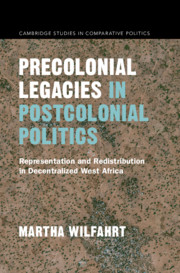 Precolonial Legacies in Postcolonial Politics
Precolonial Legacies in Postcolonial Politics Book contents
- Precolonial Legacies in Postcolonial Politics
- Cambridge Studies in Comparative Politics
- Precolonial Legacies in Postcolonial Politics
- Copyright page
- Contents
- Figures
- Tables
- Acknowledgments
- Introduction
- 1 A Theory of Institutional Congruence
- 2 Bringing Old States Back In
- 3 The Politics of Decentralization in Senegal
- 4 Political Narratives across Rural Senegal
- 5 Delivering Schools and Clinics in Rural Senegal
- 6 Congruence and Incongruence in Action
- 7 Decompressing Legacies of Public Goods Delivery, 1880–2012
- 8 Institutional Congruence beyond Senegal
- Conclusion
- Appendix
- Bibliography
- Index
- Cambridge Studies in Comparative Politics
6 - Congruence and Incongruence in Action
- Precolonial Legacies in Postcolonial Politics
- Cambridge Studies in Comparative Politics
- Precolonial Legacies in Postcolonial Politics
- Copyright page
- Contents
- Figures
- Tables
- Acknowledgments
- Introduction
- 1 A Theory of Institutional Congruence
- 2 Bringing Old States Back In
- 3 The Politics of Decentralization in Senegal
- 4 Political Narratives across Rural Senegal
- 5 Delivering Schools and Clinics in Rural Senegal
- 6 Congruence and Incongruence in Action
- 7 Decompressing Legacies of Public Goods Delivery, 1880–2012
- 8 Institutional Congruence beyond Senegal
- Conclusion
- Appendix
- Bibliography
- Index
- Cambridge Studies in Comparative Politics
Summary
This chapter deploys model-testing case studies to explore the theoretical mechanisms laid out in Chapter 1. I follow a "typical" or on-lier case selection strategy from the statistical analysis by selecting cases that are similar in as many respects as possible apart from their exposure to a precolonial polity. By pairing oral histories, in-depth interviews, and network analysis of local elite social ties, I trace how the presence of a shared social identity and dense networks shape redistributive preferences in a "typical" case of institutional congruence, while their absence generates more biased forms of redistribution elsewhere. A third case utilizes the example of a precolonial kingdom that collapsed prior to French colonization leading to the out-migration of the kingdom's population. This reinforces the necessity of the theory's mechanism of persistence – durable rural social hierarchies – to carry precolonial legacies into the calculus of local elites today.
Keywords
- Type
- Chapter
- Information
- Precolonial Legacies in Postcolonial PoliticsRepresentation and Redistribution in Decentralized West Africa, pp. 155 - 191Publisher: Cambridge University PressPrint publication year: 2021
